Banner campaign
Latest

Cash Transfers: Progress made but challenges remain
Blog Post
In five years cash programming has come from almost nowhere to being – for some donors at least – the preferred option, especially in the field of food and nutrition. “We no long measure food aid contributions in wheat/tons equivalent,” says Julia Stewart-David of the EU aid body, ECHO. “That...

USAID Procurement Executive’s Bulletin 2014-06
Policy paper
This Bulletin applies to USAID’s Acquisition Workforce consisting of Contracting Officers (COs), Agreement Officers (AOs), Negotiators, CO/AO Representatives (CORs/AORs), and Activity Managers worldwide. The purpose of this bulletin is to provide guidance to the Acquisition Workforce on promoting...

Annex B: Lebanon Case Study
Report
Cash and vouchers are increasingly provided as assistance to people affected by disaster and crisis. Studies and evaluations have firmly established that cash transfers can be an appropriate alternative or complement to in-kind assistance. Whilst some evidence exists on the Value for Money (VfM) of...

Mobile Cash Transfers for Urban Refugees in Niamey, Niger
Report
This study compared the effectiveness of cash transfers delivered through mobile phone and microfinance institutions to urban refugees in Niamey. The study found that the mobile phone delivery mechanism could be more cost-efficient than the MFI mechanism, after initial set up costs associated to...

Market Analysis for Preparedness: The urban informal settlements of Nairobi
Report
The last few years have seen a significant change in the way humanitarian organisations approach response design. Partly spurred on by the growth in cash transfer programming and market-based programming, the practice of working through and supporting local markets is now widely considered best practice...
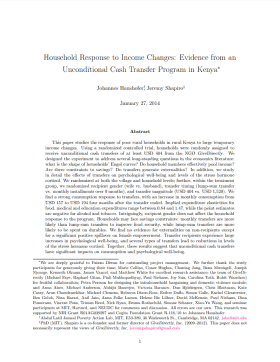
Household Response to Income Changes: Evidence from an unconditional cash transfer program in Kenya
Report
This paper studies the response of poor rural households in rural Kenya to large temporary income changes. Using a randomized controlled trial, households were randomly assigned to receive unconditional cash transfers of at least USD 404 from the NGO GiveDirectly. We designed the experiment to address...

CTP factsheet – Philippine Red Cross – cash transfer preparedness pilot
Report
The IFRC worked with four pilot countries between May 2012 and December 2013 to enable the National Societies to use cash transfer programming to address relief needs at scale, implementing it more rapidly and targeting a larger number of households. The Philippine Red Cross was one of the four...
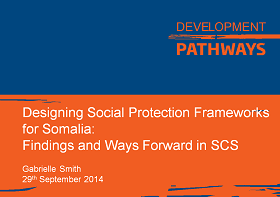
Designing Social Protection Frameworks for Somalia: Findings and Ways Forward in SCS
Report
This presentation was made on behalf of Development Pathways at the social protection framework validation meeting that took place at the Jacaranda Hotel in Nairobi, Kenya on 26 September 2014. It looks at designing social protection frameworks for Somalia and covers: 1.Activities and Methods 2.Macro...
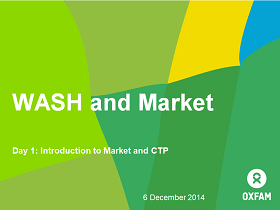
WASH and Market Training
Guidelines and Tools
These training materials were prepared by Oxfam for a WASH and market training in Khulna, Bangladesh, in December 2014. It is mainly based on the EMMA methodology. The material include presentations for the 6 days of the training (including 2 days of field work).

Social Transfer Programme in Nepal: An overview
Presentation
A overview of the social transfer programme in Nepal.

The CALP Network’s tools – a summary
Guidelines and Tools
This document provides an overview of the main tools created by the CALP Network to help the cash community of practice to learn about, share information and discuss cash transfer programmes. Download to find out more.

CTP factsheet – Senegalese Red Cross – cash transfer preparedness pilots
Report
The IFRC worked with four pilot countries between May 2012 and December 2013 to enable the National Societies to use cash transfer programming to address relief needs at scale, implementing it more rapidly and targeting a larger number of households. The Senegalese Red Cross was one of the four...

Humanitarianism in the Age of Cyber-warfare: Towards the Principled and Secure Use of Information in Humanitarian Emergencies
Report
Humanitarian assistance is driven by information. From early warnings to needs assessments to final evaluations, information determines priorities and resource allocation. In addition, a crisis drives people to collect and share personal information that they otherwise wouldn’t: the names of missing...

The CALP Network Level 2 Training – Module 1 – An Introduction to CTP
Guidelines and Tools
The objective of the Level 2 training is to strengthen the capacity of humanitarian actors in cash transfer programme design and implementation, to share recent research and learning, and encourage advocacy, institutionalisation and coordination in cash transfer programming (CTP). This training follows...
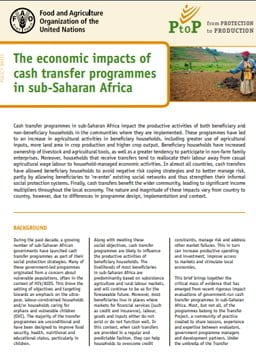
The Economic Impacts of Cash Transfer Programmes in Sub-Saharan Africa
Report
This brief brings together the critical mass of evidence that has emerged from recent rigorous impact evaluations of government-run cash transfer programmes in sub-Saharan Africa. Most, but not all, of the programmes belong to the Transfer Project, a community of practice created to share lessons,...
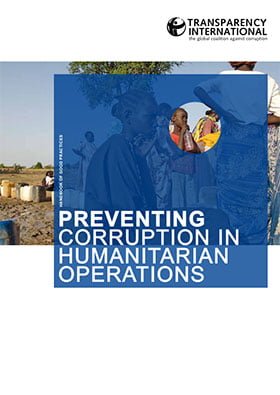
Preventing Corruption in Humanitarian operations
Guidelines and Tools
Transparency International (TI) has long held that the most damaging impact of corruption is the diversion of basic resources from poor people. Corruption in humanitarian aid is the most egregious form of this, as it deprives the most vulnerable poor people, the victims of natural disasters and civil...
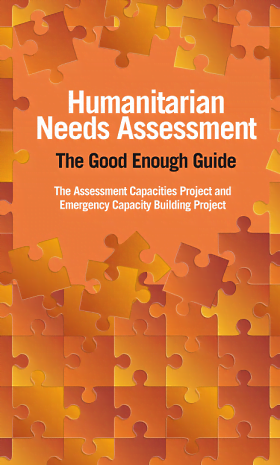
Humanitarian Needs Assessment – The Good Enough Guide
Report
Needs assessment is essential for programme planning, monitoring and evaluation, and accountability, however needs assessment is still a critical weakness of humanitarian response. Organizations urgently need to improve how they do assessments. The humanitarian community has been working on this issue...
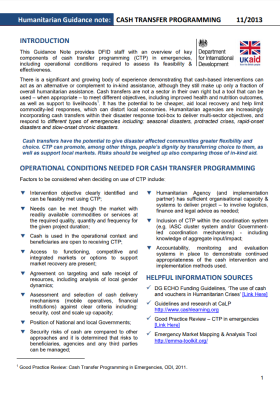
Humanitarian Guidance Note: Cash Transfer Programming
Guidelines and Tools
This Guidance Note from DfID provides an overview of key components of cash transfer programming (CTP) in emergencies, including operational conditions required to assess its feasibility & effectiveness. A brief guide to assist programme staff in writing funding proposals for cash-based interventions...
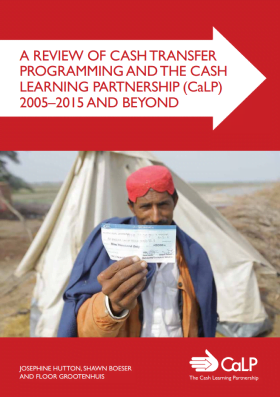
A Review of Cash Transfer Programming and the the CALP Network 2005–2015 and Beyond
Report
The core purpose of this review, commissioned by the CALP Network, is to evaluate the CALP Network’s progress since inception and examine the status and continued needs of cash programming in emergencies. Cash transfer programming (CTP) represents a significant shift in the way humanitarian aid can...

CTP factsheet – Vietnam Red Cross – cash transfer preparedness pilot
Report
The IFRC worked with four pilot countries between May 2012 and December 2013 to enable the National Societies to use cash transfer programming to address relief needs at scale, implementing it more rapidly and targeting a larger number of households. The Vietnam Red Cross was one of the four...